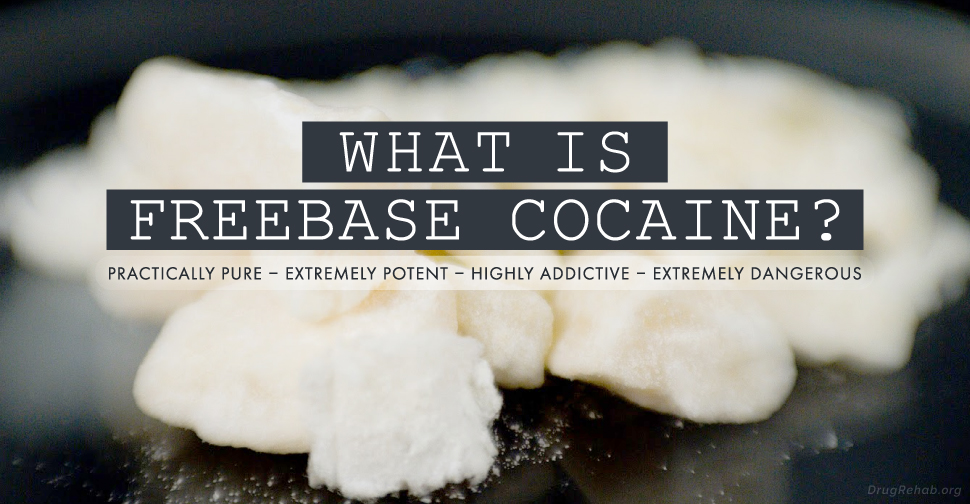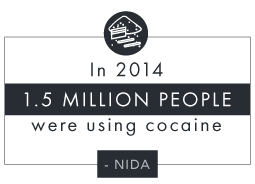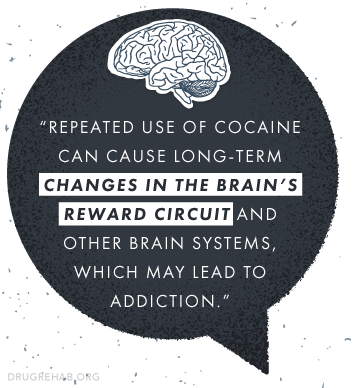
Freebase cocaine strips the substance from additives, leaving the (almost) pure form of cocaine. Cocaine in its purest form is potent and highly addictive. Risk of overdose is high for abuse of freebase cocaine, along with a myriad of health effects. Treatment for cocaine addiction is available, and can help those addicted rearrange their lives to leave addiction behind.
Freebase cocaine is a solid form of the drug— its base form. The process of making freebase cocaine involves removing hydrochloride, resulting in the solid form. Cocaine is smoked as a solid, called crack cocaine. Abusing freebase cocaine, “freebasing,” allows people to experience the drug in its purest form.
As you might guess, this produces immediate effects that are highly addictive.
Why “Freebase” Cocaine?
Once the base of cocaine has been freed, stripping away the additive, what’s left is a form of the drug that is pure. In this solid, crystal form, cocaine has a low melting point, which makes it optimal for smoking.

Any time you smoke a substance, the effects will be more immediate than consuming it orally. This is also true with smoking freebase cocaine. A person desiring an immediate high would use a small pipe to inhale the reduced vapors of the drug.
What Happens When You Take “Freebase” Cocaine?
Once you inhale the vapors, the effects are felt within seconds. The rush, or surge of euphoria, follows, lasting minutes. The rush is what gets people: it is intense, powerful, and short-lived.
After the quick rush comes the high, lasting about 30 minutes, and characterized by immense energy, sometimes clear focus, and a hypersensitivity to sight, sound, and touch. The come-down—the period following the high—lasts longer, is just as intense, and far less desirable.
When people “come down” off the high they may feel a number of extremes, such as the following:
- Anxiety
- Depression
- Fatigue
- Irritability
- Paranoia
These feelings are severe enough to make people not want to experience them again. Avoiding the awful comedown and/or withdrawal can cause people to keep abusing cocaine, especially once they develop addiction.
Long-Term Effects
Abuse of freebase cocaine can result in several long-term effects to health. Malnourishment can occur with lack of appetite, both from the effects of cocaine and from binges. During a binge, a person abusing cocaine may take several consecutive doses. This allows the person to maintain a continuous high.
But binges can be dangerous due to risk of overdose from increased amount of cocaine in the body during a short period of time. In addition, cocaine abuse can cause someone to be irritable and restless, or even extremely paranoid.
Paranoia may be one of the more severe results of cocaine abuse. It occurs especially after binges, and may be responsible for resulting hallucinations and delusions. Years of prolonged abuse can also damage nerves, affecting movement, and may even lead to Parkinson’s disease.
What Happens When You Become Addicted?
When you continually abuse an addictive substance, you increase the risk of developing addiction. Freebase cocaine is highly addictive, and abusing it is dangerous. The National Institute on Drug Abuse (NIDA) explains, “repeated use of cocaine can cause long-term changes in the brain’s reward circuit and other brain systems, which may lead to addiction.”

Addiction changes the way a person’s brain responds to feelings of pleasure (reward). Abusing freebase cocaine leads to an excess buildup in the brain of the chemical dopamine. The brain eventually adapts to this change, no longer responding to the drug’s effects.
Because the brain so enjoyed the first and any subsequent rush feelings associated with abuse, it craves that feeling. Cravings can become so intense that they disrupt your daily functioning. Life with addiction becomes all about seeking a way to fulfill and ease the cravings.
When people try to ignore these cravings or have no access to cocaine, they may experience withdrawal. This process can be physically challenging, as the body responds to the brain’s urges. Withdrawal may be characterized by:
- Anxiety
- Depression
- Fatigue
- Increase in appetite
- Insomnia
- Muscle pain
- Thoughts of self-harm
- Troubling dreams
- Slowed thought process
- Suicidal thoughts
To relieve the troubling process of withdrawal, those who are addicted may begin taking more frequent or higher doses. This can lead to overdose, which is an increased health risk, and can be fatal.
Risks Of Overdose
Part of the reason freebase cocaine is so dangerous is that it is nearly pure. Many types of the drug are mixed with something, making them less potent. Freebase cocaine is both pure and smoked to ensure a quick onset—both of these factors increase risk of overdose.

This is especially true when a person is addicted and starts increasing doses or dosage frequency. It could be easy to take too much of the drug. Also, people who typically take crack cocaine or the powdered form may not realize the potency of freebase cocaine. When switching to smoking freebase, then, they may take too much even the first time.
Overdose is a medical emergency, and should be treated that way. Symptoms of cocaine overdose include convulsions, increased heart rate, hyperventilation, and coma.
Some of the health consequences of cocaine abuse can lead to overdose as well. These include irregular heart rhythm, heart attacks, seizures, and strokes, according to the NIDA.
Treatment For Cocaine Abuse
There are currently no medications available for the treatment of cocaine abuse. However, several forms of therapy have proven effective. The NIDA states that one of the best forms of treatment available is cognitive behavioral therapy.
This evidence-based method helps addicted individuals free themselves from the routine of addiction. Once a person’s life changes for drug abuse, it is often hard to break that cycle. Cognitive behavioral therapy helps people build healthy lifestyle habits, free from drug abuse.
Other treatment approaches may include:
- Dialectical behavioral therapy
- Dual diagnosis
- Gender-based treatment
- Adventure therapy
- Wilderness therapy
Aftercare is also important in treating cocaine abuse and addiction. Seeking out support groups, taking part in 12-Step programs, and living in drug-free, residential communities are all viable aftercare options for those recovering.
Treat Cocaine Abuse And Addiction
Millions in the United States struggle every year with cocaine abuse and addiction. In 2014, 1.5 million people were currently using cocaine, as reported by the NIDA.
If you have watched someone close to you fall deeper into the cycle of addiction, you know how hard it can be to break free. But treatment can help pull you or your loved one out of the habit of abuse and into a new lifestyle. Contact us today at DrugRehab.org to hear more about rehab centers, talk to someone about cocaine addiction, or learn about treatment options.
For More Information Related to “Freebase Cocaine” Be Sure To Check Out These Additional Resources From DrugRehab.org:
Sources
Center For Abuse Substance Research—Cocaine
Drug Free World—Effects Of Cocaine
National Institute On Drug Abuse—DrugFacts: Cocaine

